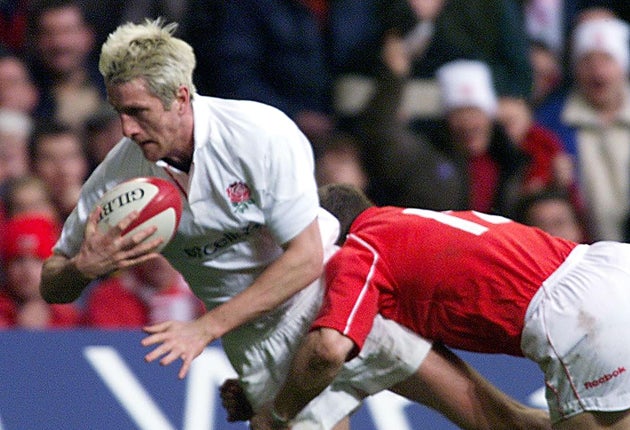Brian Ashton: Child's play? It's really a thinking man's game
Tackling The Issues

After wrapping myself up in rugby union for so much of my life, I've spent a good deal of time over the last 18 months or so working alongside a wide range of specialist support staff – coaches, medics, psychologists – from a variety of sports, some of them involved at grass-roots level and others operating in the highest echelons of elite performance.
It has been a pleasure, a privilege and, in many respects, an eye-opener. What has struck me most forcibly? The fact that many of the key issues I've identified concerning the relationship between coaches and players in rugby are to be found across the spectrum.
The topics at the forefront of my discussions have been twofold: how do we encourage players to assume responsibility for their own actions in the competitive arena, and how do we underpin this by developing their game understanding? These points lead to a more profound debate about the nature of professionalism and its apparent blurring of the boundaries of player-coach relations. Do we really want our team games to be controlled ever more tightly by coaches and their so-called "playbooks", or do we want our players to be granted the freedom to follow their instincts? If the answer is the latter, are we coaching those instincts into oblivion?
Let me put my cards on the table once again. While I understand and agree with the concept of the supportive coaching environment and believe in the importance of value-added guidance, it is obvious to me that, in the final analysis, sporting success hinges on individual players' response to what I call "stand-alone moments": those crucial points in a game where they must think clearly and act decisively without help. If there is a point to coaching, surely it is to develop a player's sense of self-sufficiency and his ability to act independently, rather than spoon-feeding him information and turning him into something akin to a robot.
Last year, I found myself on a coaching course alongside Christian Cullen, the All Black full-back who, to my mind at least, ranks high among the finest counter-attacking players ever seen in the union game. I remember him being very nervous about making a presentation on the very subject of the counter-attack. "I don't know where to start," he said. "The things I did were completely instinctive." In the end, he insisted that we all went outside for an on-field demonstration. It frightened the rest of us to death, I can tell you.
It set me thinking about the philosophy of street games. That's right, the games kids used to play in the streets here – the games of beach football still played by youngsters in Brazil, the games of rubbish-tip cricket played by thousands of children in India. It seems to me that in the modern world of technologically advanced, science-based coaching, the occasional return to something much more basic, yet in some ways far more challenging, might have some merit.
Now, I don't want to give an old Northerner's lecture along the lines of "when I were a lad", but you know the kind of thing I mean: you picked two teams, made up your own rules, decided on the size and shape of the playing area, refereed the game among yourselves and generally got on with it. There were certainly no coaches and, in their absence, you developed a style that suited you and helped you survive, thrive and, if you were good enough, prevail.
Of course, I can hear today's coaches saying: "Wait a minute. This is precisely the kind of thing that encourages bad habits and poor technique." But while I accept that there are certain technical fundamentals in all sporting endeavour, I don't buy the idea that there's any such thing as "classical technique". I still have some footage of a try England put past Wales when I was involved back in 2001. Every member of the back line handled the ball and there were six passes from start to Will Greenwood's finish, all of them different. Each was delivered quickly, accurately and at the right moment, but were they out of the coaching textbook? Not to my eye.
Street game theory, if you want to give it a grand title, encourages awareness, discipline and leadership. The immediacy of it places a high value on adaptability, and there is also a premium on playing by the rules: I grew up learning about rugby and cricket in the street and it quickly became obvious to all those involved that if everyone was going to stand offside all day, or wouldn't walk when they were out, there was no point bothering. Taking everything into consideration, are there many better ways of instilling the basic qualities required for success, whatever the level?
If we really want our players to embrace creativity, shouldn't we encourage those coaching mini- rugby teams to do away with the cones, bibs, tackle shields and all the rest of the paraphernalia once in a while and say: "Right, here's a ball and here's a patch of grass. Let's see what you make of it." Come to think of it, shouldn't Premiership coaches say something similar every now and again?
I'm not holding my breath: it's not in the nature of most coaches to step away and let the players do their own thing occasionally. But if we're genuinely interested in removing some of the baggage that weighs down so many of our top professionals, why not think outside the box and experiment a little? It might work wonders and, who knows, the players may enjoy it.
Join our commenting forum
Join thought-provoking conversations, follow other Independent readers and see their replies
Comments
Bookmark popover
Removed from bookmarks